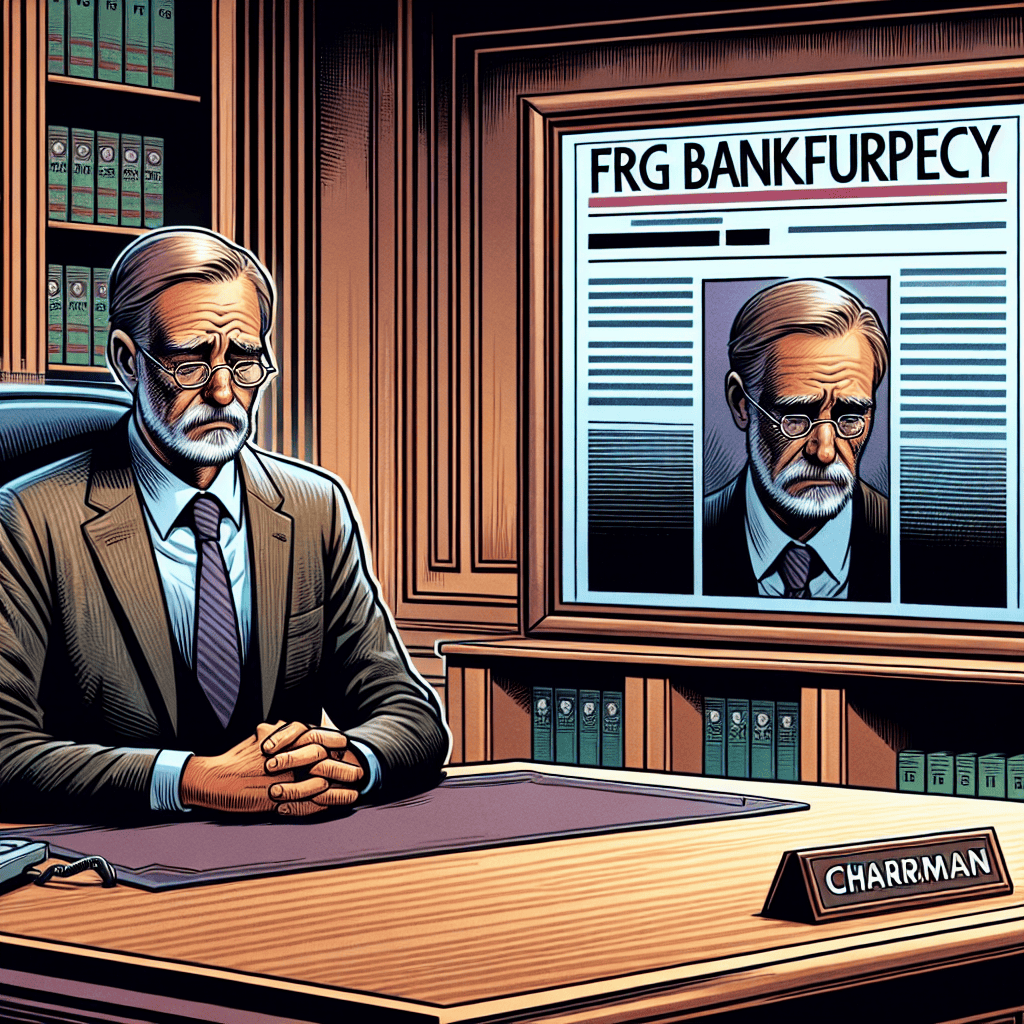“Leadership in Reflection: Navigating Regret Amidst Financial Turmoil”
Introduction
B. Riley Financial’s Chairman recently expressed profound regret over the bankruptcy filing of Franchise Group, Inc. (FRG), a development that has sent ripples through the financial and business communities. The chairman’s statement underscores the unexpected nature of the bankruptcy and highlights the challenges faced by FRG in navigating a rapidly changing economic landscape. This expression of regret not only reflects the personal and professional disappointment felt by B. Riley’s leadership but also signals the broader implications for stakeholders involved. The bankruptcy marks a significant moment for FRG, a company that has been a notable player in its sector, and raises questions about the strategic decisions leading up to this point. As the situation unfolds, the focus will likely shift to understanding the factors that contributed to FRG’s financial difficulties and exploring potential paths forward for recovery and restructuring.
Impact Of FRG Bankruptcy On B. Riley’s Financial Strategy
The recent bankruptcy of Franchise Group Inc. (FRG) has sent ripples through the financial landscape, particularly impacting B. Riley Financial, a prominent investment bank and financial services company. The chairman of B. Riley, in a recent statement, expressed profound regret over the unfortunate turn of events, highlighting the significant implications this bankruptcy holds for the company’s financial strategy. As B. Riley had been a key stakeholder in FRG, the bankruptcy not only affects its immediate financial standing but also necessitates a reevaluation of its broader investment approach.
To understand the gravity of the situation, it is essential to consider the role B. Riley played in FRG’s operations. As a major investor, B. Riley had provided substantial financial backing to FRG, anticipating robust returns from its diverse portfolio of retail and service brands. However, the unexpected financial collapse of FRG has led to considerable losses, compelling B. Riley to reassess its investment strategies and risk management practices. This development underscores the inherent volatility in the investment landscape, where even well-calculated ventures can face unforeseen challenges.
In light of the FRG bankruptcy, B. Riley’s chairman has emphasized the need for a more cautious and diversified investment strategy moving forward. This involves not only scrutinizing potential investments with greater diligence but also ensuring that the company’s portfolio is balanced across various sectors to mitigate risks. The chairman’s statement reflects a commitment to learning from this setback and adapting the company’s financial strategy to better withstand future uncertainties. By doing so, B. Riley aims to safeguard its stakeholders’ interests and maintain its reputation as a resilient and forward-thinking financial institution.
Moreover, the bankruptcy has prompted B. Riley to enhance its risk assessment frameworks. This involves integrating more comprehensive analytical tools and methodologies to evaluate the financial health and sustainability of potential investments. By adopting a more rigorous approach to risk management, B. Riley seeks to identify potential red flags earlier in the investment process, thereby reducing the likelihood of encountering similar challenges in the future. This strategic shift not only aims to protect the company’s financial interests but also to restore confidence among its investors and partners.
Additionally, the FRG bankruptcy has highlighted the importance of maintaining strong communication channels with stakeholders. B. Riley’s chairman has acknowledged the need for transparency and open dialogue with investors, clients, and partners to navigate the complexities of the current financial environment. By fostering a culture of transparency, B. Riley hopes to build trust and reinforce its commitment to responsible and ethical business practices.
In conclusion, the bankruptcy of Franchise Group Inc. has undeniably impacted B. Riley’s financial strategy, prompting a thorough reassessment of its investment approach and risk management practices. While the situation presents significant challenges, it also offers an opportunity for B. Riley to refine its strategies and emerge stronger. By adopting a more cautious and diversified investment approach, enhancing risk assessment frameworks, and maintaining transparent communication with stakeholders, B. Riley aims to navigate this setback effectively and continue its trajectory as a leading financial services provider. The chairman’s expression of deep regret serves as a reminder of the unpredictable nature of the financial world and the importance of resilience and adaptability in the face of adversity.
Lessons Learned From FRG Bankruptcy: A Chairman’s Perspective
In the wake of the recent bankruptcy filing by Franchise Group Inc. (FRG), B. Riley Financial’s Chairman has expressed profound regret over the unfortunate turn of events. This development has prompted a reflective examination of the circumstances leading to the bankruptcy, offering valuable lessons for stakeholders and industry observers alike. The Chairman’s perspective provides a unique insight into the complexities and challenges faced by companies in today’s volatile economic environment.
The bankruptcy of FRG, a company once considered a robust player in the retail sector, underscores the unpredictable nature of business operations. The Chairman’s regret is not merely a personal sentiment but a reflection of the broader implications for investors, employees, and the market. It serves as a stark reminder of the importance of strategic foresight and adaptability in navigating the ever-changing business landscape. The Chairman emphasized the need for companies to remain vigilant and responsive to market signals, highlighting that complacency can lead to dire consequences.
One of the critical lessons from the FRG bankruptcy is the significance of maintaining a strong financial foundation. The Chairman pointed out that while growth and expansion are essential for any business, they must be pursued with caution and a clear understanding of the associated risks. Over-leveraging and aggressive expansion without adequate risk management strategies can lead to financial instability, as evidenced by FRG’s downfall. This situation illustrates the necessity for companies to balance ambition with prudence, ensuring that growth initiatives are sustainable and aligned with long-term objectives.
Furthermore, the Chairman’s reflections bring to light the importance of effective leadership and governance. In times of crisis, strong leadership is crucial in steering the company through turbulent waters. The FRG bankruptcy highlights the need for leaders to possess not only strategic acumen but also the ability to make tough decisions under pressure. The Chairman stressed that transparent communication and decisive action are vital components of effective leadership, particularly when navigating financial distress.
In addition to leadership, the role of corporate governance cannot be overstated. The Chairman acknowledged that robust governance structures are essential in safeguarding the interests of all stakeholders. This includes implementing rigorous oversight mechanisms and fostering a culture of accountability within the organization. The FRG case serves as a cautionary tale for companies to prioritize governance and ensure that their boards are equipped to provide the necessary guidance and oversight.
Moreover, the Chairman’s perspective highlights the importance of innovation and adaptability in sustaining business success. In an era characterized by rapid technological advancements and shifting consumer preferences, companies must be agile and open to change. The failure to innovate and adapt can render even the most established businesses obsolete. The FRG bankruptcy serves as a reminder that companies must continuously evaluate their strategies and embrace innovation to remain competitive.
In conclusion, the FRG bankruptcy has provided a sobering lesson for the business community. The Chairman’s expression of regret underscores the multifaceted challenges that companies face and the critical importance of strategic foresight, financial prudence, effective leadership, and robust governance. As businesses navigate an increasingly complex environment, these lessons serve as a guiding framework for building resilience and ensuring long-term success. The insights gleaned from this experience will undoubtedly inform future strategies and decision-making processes, ultimately contributing to a more stable and sustainable business landscape.
The Role Of Leadership In Navigating Corporate Bankruptcy
In the complex world of corporate finance, the role of leadership is pivotal, especially when navigating the turbulent waters of bankruptcy. The recent bankruptcy of Franchise Group Inc. (FRG) has brought this issue to the forefront, with B. Riley Financial’s Chairman expressing profound regret over the situation. This incident underscores the critical importance of effective leadership in steering companies through financial distress and highlights the multifaceted responsibilities that leaders bear in such challenging times.
Leadership in a corporate setting involves not only strategic decision-making but also the ability to foresee potential financial pitfalls and act proactively to mitigate them. In the case of FRG, the bankruptcy filing has raised questions about the decisions made by its leadership team and the extent to which these decisions contributed to the company’s financial decline. The Chairman of B. Riley, a key stakeholder in FRG, has publicly acknowledged the missteps that may have led to this unfortunate outcome, emphasizing the need for accountability and reflection in leadership roles.
Moreover, the expression of regret by B. Riley’s Chairman serves as a reminder of the human element inherent in corporate leadership. Leaders are not infallible; they are susceptible to errors in judgment, particularly in high-pressure environments where the stakes are exceedingly high. This acknowledgment of fallibility is crucial, as it opens the door to learning and growth, both for the individuals involved and for the organization as a whole. By admitting to mistakes, leaders can foster a culture of transparency and continuous improvement, which is essential for recovery and future success.
Transitioning from the acknowledgment of past errors, it is imperative to consider the strategies that effective leaders can employ to navigate bankruptcy successfully. One such strategy is the development of a comprehensive restructuring plan that addresses the root causes of financial distress while charting a clear path forward. This plan should be grounded in a realistic assessment of the company’s assets, liabilities, and market position, and should involve input from a diverse range of stakeholders, including creditors, employees, and shareholders. By engaging these stakeholders in the restructuring process, leaders can build consensus and support for the necessary changes, thereby increasing the likelihood of a successful turnaround.
In addition to strategic planning, effective communication is another critical component of leadership during bankruptcy. Leaders must be able to convey complex financial information clearly and persuasively to a variety of audiences, including investors, regulators, and the public. This requires not only technical expertise but also emotional intelligence and empathy, as stakeholders may be experiencing significant anxiety and uncertainty about the future. By communicating openly and honestly, leaders can build trust and credibility, which are essential for maintaining stakeholder confidence during difficult times.
Furthermore, the role of leadership in navigating corporate bankruptcy extends beyond the immediate financial concerns to encompass broader ethical and social responsibilities. Leaders must consider the impact of their decisions on employees, customers, and the communities in which they operate. This involves making difficult choices about layoffs, asset sales, and other cost-cutting measures, while striving to minimize harm and preserve the company’s long-term viability.
In conclusion, the bankruptcy of FRG and the subsequent expression of regret by B. Riley’s Chairman highlight the critical role of leadership in managing corporate financial distress. By acknowledging past mistakes, developing strategic restructuring plans, communicating effectively, and considering ethical responsibilities, leaders can guide their organizations through bankruptcy and lay the foundation for a more stable and prosperous future.
Analyzing The Financial Implications Of FRG’s Downfall

The recent bankruptcy of Franchise Group Inc. (FRG) has sent ripples through the financial community, prompting a wave of analysis and reflection on the factors that led to this unfortunate outcome. Among those expressing deep regret over the situation is the Chairman of B. Riley Financial, a key stakeholder in FRG. This development has not only raised questions about the strategic decisions made by FRG’s management but also highlighted the broader financial implications for investors and stakeholders involved.
To begin with, the downfall of FRG can be attributed to a confluence of strategic missteps and external economic pressures. The company, which was once a promising player in the franchise sector, struggled to adapt to the rapidly changing market dynamics. As consumer preferences shifted and competition intensified, FRG found itself grappling with declining revenues and mounting debts. Despite efforts to restructure and streamline operations, the company was unable to regain its footing, ultimately leading to its bankruptcy filing.
The regret expressed by B. Riley’s Chairman underscores the significant financial implications of FRG’s collapse. As a major investor, B. Riley had placed considerable faith in FRG’s potential for growth and profitability. The bankruptcy not only represents a substantial financial loss for B. Riley but also serves as a cautionary tale for investors about the inherent risks associated with investing in companies facing operational challenges. This situation highlights the importance of conducting thorough due diligence and maintaining a vigilant approach to investment decisions.
Moreover, the bankruptcy of FRG has broader implications for the franchise industry as a whole. It serves as a stark reminder of the volatility and unpredictability that can characterize this sector. Franchise businesses, while offering the allure of established brand recognition and support, are not immune to market fluctuations and operational hurdles. The downfall of a prominent player like FRG may prompt other franchise operators to reassess their strategies and financial health, potentially leading to a wave of restructuring efforts across the industry.
In addition to the immediate financial repercussions, FRG’s bankruptcy also raises questions about the role of corporate governance and leadership in navigating challenging economic landscapes. The decisions made by FRG’s management team, including expansion strategies and financial planning, are now under scrutiny. This situation underscores the critical importance of strong leadership and sound governance practices in steering companies through turbulent times. Investors and stakeholders are likely to demand greater transparency and accountability from corporate leaders in the wake of such high-profile failures.
Furthermore, the FRG bankruptcy serves as a reminder of the interconnectedness of financial markets and the ripple effects that can result from the downfall of a single entity. The impact of FRG’s bankruptcy extends beyond its immediate stakeholders, affecting suppliers, employees, and even local economies that relied on the company’s operations. This interconnectedness highlights the need for a comprehensive understanding of the broader economic landscape when assessing the potential risks and rewards of investment opportunities.
In conclusion, the bankruptcy of Franchise Group Inc. has prompted a period of reflection and analysis within the financial community. The regret expressed by B. Riley’s Chairman is indicative of the significant financial implications and lessons to be learned from this situation. As stakeholders navigate the aftermath of FRG’s downfall, it is crucial to consider the broader implications for the franchise industry, corporate governance, and the interconnected nature of financial markets. This case serves as a poignant reminder of the complexities and challenges inherent in the world of business and finance.
B. Riley’s Future Plans Post-FRG Bankruptcy
In the wake of the recent bankruptcy filing by Franchise Group Inc. (FRG), B. Riley Financial’s Chairman has expressed profound regret over the unfortunate turn of events. This development has prompted a reevaluation of B. Riley’s strategic direction and future plans. The bankruptcy of FRG, a company in which B. Riley had a significant financial interest, has undoubtedly sent ripples through the financial community, raising questions about the implications for B. Riley’s future operations and investment strategies.
The Chairman’s expression of regret underscores the gravity of the situation and the impact it has had on B. Riley’s portfolio. As a key stakeholder, B. Riley had been actively involved in FRG’s operations, providing financial support and strategic guidance. The bankruptcy, therefore, represents not only a financial setback but also a challenge to B. Riley’s reputation as a reliable partner in the investment community. In light of this, the company is now focused on reassessing its investment strategies to prevent similar occurrences in the future.
Transitioning from this setback, B. Riley is committed to learning from the FRG experience and implementing more robust risk management practices. This involves a thorough analysis of the factors that led to FRG’s financial difficulties and identifying any warning signs that may have been overlooked. By doing so, B. Riley aims to enhance its due diligence processes and ensure that future investments are subjected to more rigorous scrutiny. This proactive approach is intended to safeguard the company’s interests and those of its clients, reinforcing its commitment to prudent financial management.
Moreover, B. Riley is exploring opportunities to diversify its investment portfolio further. The FRG bankruptcy has highlighted the risks associated with concentrated investments, prompting the company to consider a broader range of sectors and asset classes. By diversifying its holdings, B. Riley seeks to mitigate the impact of any single investment’s underperformance on its overall financial health. This strategic shift is expected to provide greater stability and resilience in the face of market fluctuations, thereby enhancing the company’s long-term growth prospects.
In addition to these internal measures, B. Riley is also engaging with its stakeholders to rebuild trust and confidence. The Chairman has emphasized the importance of transparent communication and has pledged to keep investors informed about the company’s progress in addressing the challenges posed by the FRG bankruptcy. This open dialogue is crucial in maintaining strong relationships with clients and partners, ensuring that they remain confident in B. Riley’s ability to navigate the complexities of the financial landscape.
Looking ahead, B. Riley is determined to emerge from this experience as a stronger and more resilient organization. The lessons learned from the FRG bankruptcy will serve as a catalyst for positive change, driving the company to refine its strategies and enhance its operational capabilities. By focusing on risk management, diversification, and stakeholder engagement, B. Riley is poised to overcome the current challenges and continue its trajectory of growth and success.
In conclusion, while the FRG bankruptcy has undoubtedly been a significant setback for B. Riley, it also presents an opportunity for reflection and improvement. The company’s commitment to learning from this experience and implementing strategic changes demonstrates its resolve to adapt and thrive in an ever-evolving financial environment. As B. Riley charts a new course for the future, it remains steadfast in its dedication to delivering value to its clients and stakeholders.
Stakeholder Reactions To B. Riley Chairman’s Statement
In the wake of the recent bankruptcy filing by Franchise Group Inc. (FRG), the financial community has been abuzz with reactions, particularly following the statement issued by B. Riley Financial’s Chairman. The chairman expressed profound regret over the unfortunate turn of events, acknowledging the significant impact on stakeholders, including employees, investors, and creditors. This expression of remorse has sparked a range of responses from various stakeholders, each interpreting the statement through their unique perspectives and interests.
To begin with, investors have been particularly vocal in their reactions. Many have expressed disappointment, not only with the bankruptcy itself but also with the perceived lack of foresight and strategic planning that led to this outcome. The chairman’s statement, while empathetic, has been met with skepticism by some investors who feel that more proactive measures could have been taken to avert the crisis. They argue that the expression of regret, though appreciated, does little to mitigate the financial losses they now face. This sentiment underscores the broader frustration within the investment community, which is grappling with the implications of the bankruptcy on their portfolios.
Meanwhile, employees of Franchise Group Inc. have reacted with a mix of concern and cautious optimism. The chairman’s acknowledgment of the human impact of the bankruptcy has been seen as a positive step, providing a sense of validation to those who have dedicated their careers to the company. However, the uncertainty surrounding their future employment remains a pressing concern. Many employees are anxious about potential job losses and the subsequent effects on their livelihoods. The chairman’s statement, while offering a degree of reassurance, has not fully alleviated these fears, leaving employees in a state of limbo as they await further developments.
Creditors, on the other hand, have approached the situation with a pragmatic lens. The chairman’s expression of regret has been noted, but creditors are primarily focused on the financial implications of the bankruptcy. Their primary concern is the recovery of outstanding debts and the potential restructuring of FRG’s financial obligations. The statement has been interpreted as a necessary acknowledgment of the situation, but creditors are keenly aware that actions, rather than words, will ultimately determine the resolution of their claims. This pragmatic approach highlights the creditors’ focus on tangible outcomes in the wake of the bankruptcy.
In addition to these primary stakeholders, industry analysts have weighed in on the chairman’s statement, offering insights into its broader implications. Analysts have noted that the expression of regret is indicative of a larger trend within the corporate world, where transparency and accountability are increasingly valued by stakeholders. The chairman’s candid acknowledgment of the situation reflects a shift towards more open communication, which analysts believe could foster greater trust between companies and their stakeholders in the long run. However, they caution that such statements must be accompanied by concrete actions to address the underlying issues that led to the bankruptcy.
In conclusion, the B. Riley Chairman’s expression of deep regret over FRG’s bankruptcy has elicited a spectrum of reactions from stakeholders, each shaped by their unique interests and concerns. While the statement has been acknowledged as a step towards transparency and accountability, stakeholders remain focused on the tangible outcomes that will emerge from this challenging situation. As the financial community continues to navigate the repercussions of the bankruptcy, the emphasis will undoubtedly be on actions that align with the sentiments expressed in the chairman’s statement.
Crisis Management: How B. Riley Is Addressing FRG Bankruptcy
In the wake of the recent bankruptcy filing by Franchise Group Inc. (FRG), B. Riley Financial, a key stakeholder, has found itself at the center of a financial storm. The chairman of B. Riley, Bryant Riley, has expressed profound regret over the situation, acknowledging the significant impact this development has on all parties involved, including employees, investors, and creditors. As the financial community grapples with the implications of this bankruptcy, B. Riley is taking decisive steps to manage the crisis and mitigate its effects.
To begin with, the chairman’s expression of regret underscores the gravity of the situation and the responsibility B. Riley feels towards those affected. This sentiment is not merely a public relations gesture but a genuine acknowledgment of the challenges that lie ahead. By openly addressing the issue, B. Riley aims to foster transparency and maintain trust with stakeholders, which is crucial during such turbulent times. This approach is part of a broader strategy to navigate the complexities of the bankruptcy process while safeguarding the interests of all involved.
In addition to expressing regret, B. Riley is actively engaging with FRG’s management team to explore potential avenues for restructuring and recovery. This collaboration is essential to developing a viable plan that can address the financial challenges facing FRG. By leveraging its expertise in financial advisory and restructuring, B. Riley is well-positioned to provide the necessary guidance and support to FRG as it seeks to emerge from bankruptcy. This proactive involvement is indicative of B. Riley’s commitment to finding a resolution that minimizes disruption and preserves value.
Moreover, B. Riley is working closely with creditors to negotiate terms that are equitable and sustainable. This involves a delicate balancing act, as the interests of various stakeholders must be aligned to facilitate a successful restructuring. By fostering open lines of communication and encouraging constructive dialogue, B. Riley aims to build consensus and pave the way for a collaborative approach to resolving the bankruptcy. This emphasis on cooperation is critical to ensuring that all parties can move forward with confidence and clarity.
Furthermore, B. Riley is also focusing on maintaining operational stability within FRG during this period of uncertainty. This involves implementing measures to ensure that day-to-day operations continue smoothly, thereby minimizing disruptions to customers and employees. By prioritizing operational continuity, B. Riley seeks to preserve the core business functions of FRG, which is essential for any successful restructuring effort. This focus on stability is a testament to B. Riley’s commitment to safeguarding the long-term viability of FRG.
In conclusion, the bankruptcy of Franchise Group Inc. presents significant challenges, but B. Riley is taking comprehensive steps to address the situation. Through expressions of regret, active engagement with management, collaboration with creditors, and a focus on operational stability, B. Riley is demonstrating its commitment to effective crisis management. As the process unfolds, the financial community will be closely watching how B. Riley navigates this complex landscape, with the hope that its efforts will lead to a successful resolution and a brighter future for all stakeholders involved.
Q&A
1. **What is the main topic of the article?**
The article discusses the B. Riley Chairman’s expression of deep regret over the bankruptcy of Franchise Group (FRG).
2. **Who is the chairman of B. Riley?**
The article does not specify the name of the chairman.
3. **What is FRG?**
FRG stands for Franchise Group, a company that has filed for bankruptcy.
4. **What was the chairman’s reaction to the bankruptcy?**
The chairman expressed deep regret over the bankruptcy of FRG.
5. **What reasons were given for FRG’s bankruptcy?**
The article does not provide specific reasons for FRG’s bankruptcy.
6. **How does the bankruptcy affect B. Riley?**
The article does not detail the specific effects of FRG’s bankruptcy on B. Riley.
7. **What are the future plans for FRG post-bankruptcy?**
The article does not outline any future plans for FRG following its bankruptcy.
Conclusion
The B. Riley Chairman’s expression of deep regret over the FRG bankruptcy highlights the significant impact and disappointment associated with the financial collapse. It underscores the challenges faced by the company and the broader implications for stakeholders, including employees, investors, and creditors. The statement of regret may also reflect a commitment to transparency and accountability, as well as a desire to learn from the situation to prevent similar occurrences in the future. Overall, the expression of regret serves as an acknowledgment of the gravity of the bankruptcy and its effects on all involved parties.





